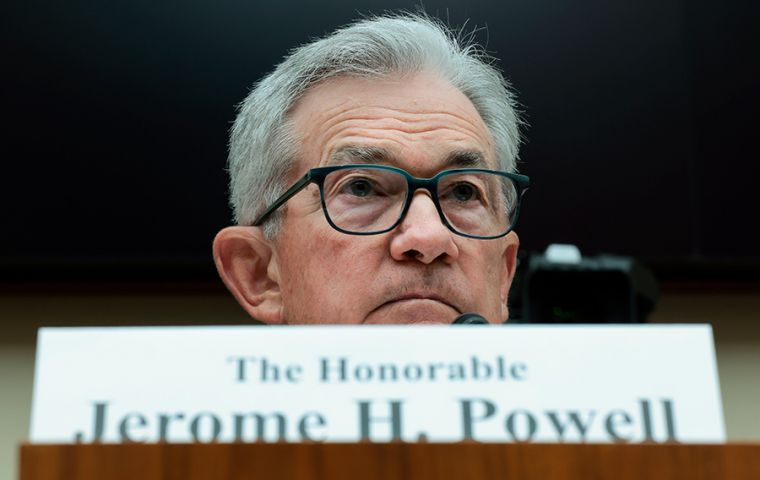MercoPress. South Atlantic News Agency
Fed's Powell questioned in Congress over inflation and bank regulation
 “Inflation pressures continue to run high, and the process of getting inflation back down to 2% has a long way to go,” Powell said on Capitol Hill.
“Inflation pressures continue to run high, and the process of getting inflation back down to 2% has a long way to go,” Powell said on Capitol Hill. Since inflation in the United States is still excessive, most Federal Reserve officials expect to raise interest rates further this year this year, Chair Jerome Powell told a House committee on Wednesday, who also had to respond about alleged further banking regulations.
“Inflation pressures continue to run high, and the process of getting inflation back down to 2% has a long way to go,” Powell said on the first of two days of semi-annual testimony on Capitol Hill.
Even so, the Fed last week kept interest rates unchanged after ten straight hikes so it could take time to gauge how higher borrowing rates have affected the economy, Powell said.
The contrast between the Fed’s stated concern over still-high inflation and its decision to skip a rate hike has heightened uncertainty about its next moves. The hazier messaging suggests that Powell is seeking to balance competing demands from those Fed officials who want to keep raising rates and others who feel the central bank has done enough.
Asked on Wednesday to clarify last week’s messaging, Powell told the House Financial Services Committee that keeping rates level was consistent with the Fed’s increasing focus: Slowing the pace of its hikes in order to avoid raising rates higher than needed to reduce inflation and risk causing a deep recession in the process.
“It may make sense to move rates higher but to do so at a more moderate pace,” Powell said, likening the Fed’s rate hikes to a journey. “As you get closer to your destination, as you try to find that destination, you slow down even further.”
Partisan differences over the Fed’s policies emerged at the hearing, with Rep. Patrick McHenry, the North Carolina Republican who chairs the committee, saying the central bank “must remain committed to eliminating this stealth tax on American workers and families,” referring to inflation. “And I urge you to continue that resolve.”
Yet Rep. Maxine Waters of California, the senior Democrat on the panel, said “the Fed made the right decision to pause interest rate hikes.”
In his remarks Wednesday, Powell also indicated that the Fed chose to keep its key interest rate steady last week so it could assess the impact of three large bank failures on the banking sector and whether the failures would reduce credit to consumers and businesses and slow the economy.
Despite the Fed’s focus on combating inflation, Republican committee members spent more time on Wednesday questioning Powell about the central bank’s stance on bank regulation. McHenry suggested that Congress consider removing the Fed’s authority to regulate banks, if the policymakers take too strict an approach to overseeing small and medium-size lenders and potentially weaken lending.
After this year’s bank failures, Michael Barr, the Fed’s top financial regulator, indicated that the central bank might consider raising the level of capital that banks are required to hold in reserve against potential losses as a way to limit further failures.
But some committee Republicans argued Wednesday that requiring banks to hold more funds in reserve would restrict their ability to lend. Small businesses, they warned, would be especially hurt because they depend more on bank loans than do large companies, which can issue their own bonds. Reduced lending, they asserted, would weaken the economy.
Powell responded that any new such rules would likely focus on the largest U.S. banks — those with more than US$100 billion in assets, like Silicon Valley Bank and the other two institutions that failed. Community banks, by contrast, typically have under US$10 billion in assets.
The Fed chair also said it could be several years before such rules would take effect. At the same time, he underscored that there is always a trade-off between requiring banks to hold certain levels of funds in reserve and encouraging lending. The challenge, he said, is to strike the right balance.




Top Comments
Disclaimer & comment rulesCommenting for this story is now closed.
If you have a Facebook account, become a fan and comment on our Facebook Page!